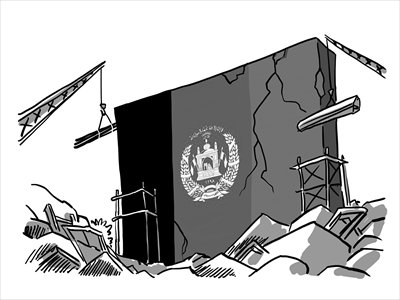M WAQAR..... "A man's ethical behavior should be based effectually on sympathy, education, and social ties; no religious basis is necessary.Man would indeed be in a poor way if he had to be restrained by fear of punishment and hope of reward after death." --Albert Einstein !!! NEWS,ARTICLES,EDITORIALS,MUSIC... Ze chi pe mayeen yum da agha pukhtunistan de.....(Liberal,Progressive,Secular World.)''Secularism is not against religion; it is the message of humanity.'' تل ده وی پثتونستآن
Monday, June 24, 2013
Afghan prospects strong for post-US era
The US-led coalition forces have announced their planned withdrawal from Afghanistan in 2014. To meet the deadline, many members have already started extracting their soldiers and equipment from Afghanistan.
A number of initiatives have already been undertaken as part of the transition in Afghanistan.
The Afghan National Army is taking the lead in securing Afghanistan. The coalition forces are switching to a support role by providing training, equipment and financial support. And the Afghan National Police forces are getting more professional and responsible for security in Afghan cities.
In addition to transition in security issues, Afghans are taking on more responsibilities in leading development activities.
The Afghan government is assuming more ownership in public service delivery and the private sector is doing most of the things international contractors used to do.
When the Soviet Union left, the Afghan government was weak and limited to big cities, and an ideology-driven insurgency was much stronger in the country side. Besides, unemployment was high, the economy was in a critical situation, and the central government had uneasy relations with its neighbors, like Pakistan.
The present Afghan government also grapples with similar issues. However, the situation is far less threatening than it used to be in the 1990s.
Unlike in the 1990s, Afghanistan is now constitutionally an "Islamic Republic" forestalling any organized ideological confrontations.
The present Afghan government and society enjoy better international relations and support than in the 1990s. Most Western countries have established strategic partnerships with the Afghan government, outlining their commitment to supporting Afghanistan well beyond 2014.
In addition to the strategic partnership documents, Afghanistan and the US are negotiating a compact that spells out the responsibilities of the residual US military presence in Afghanistan.
Other than a few public schools and universities in 2001, Afghanistan had no private schools or investment in education. But today, Afghanistan has many private schools that complement the public education system.
Private investment in the health sector has also helped in the boom of private health facilities across the country. Some, such as the DK German Medical Diagnostic Center in Kabul, are explicitly foreign-owned, providing top quality services in Kabul.
Developments in infrastructure construction, information technology, media and communication, banking, aviation, mining, trade and financial services have been unprecedented.
Ordinary Afghans have mixed feelings about Afghanistan's future. Most recognize the mentioned developments, while they also understand that a lot more need to be done to keep the momentum going.
A taxi driver in Kabul told me that "The situation in Kabul has changed drastically. In the past, one could not go safely from east to west and paved roads did not exist. There wasn't enough food, and having a car was a luxury. But today that has changed. Ordinary people can travel freely in Kabul and many provinces of the country. More Afghans have got involved in successful private businesses."
There is a consensus both among Afghans and the international community that nobody wants a return to the 1990s. A huge amount of blood and treasure, both by outsiders and Afghans, have been spent in bringing Afghanistan to where it is now.
Many factors will have a profound impact on future stability: the conduct and perception of the upcoming presidential elections in 2014 and the parliamentary elections in 2015, improvements in Afghanistan's relations with its immediate neighbors, international attention and support for the young democracy, investment and diversity in the Afghan economy, and more continuous investment in competent and motivated young Afghan men and women.
If Afghans can stay united, they will have the hope of continuing their achievements and forging a better life post-2014.
Subscribe to:
Post Comments (Atom)


No comments:
Post a Comment